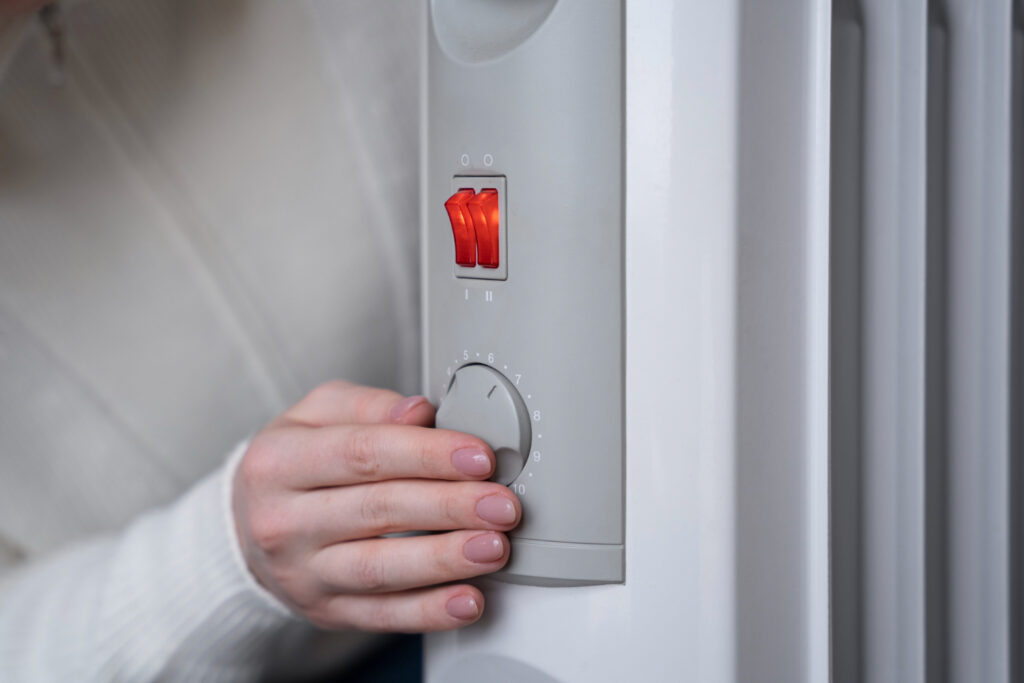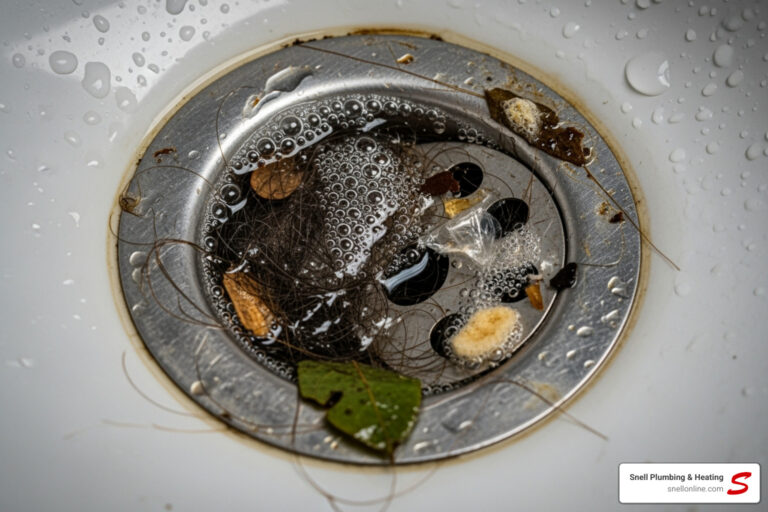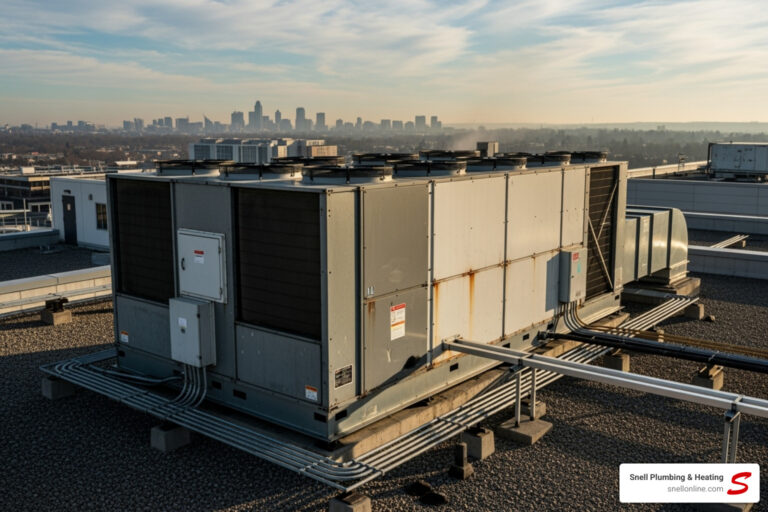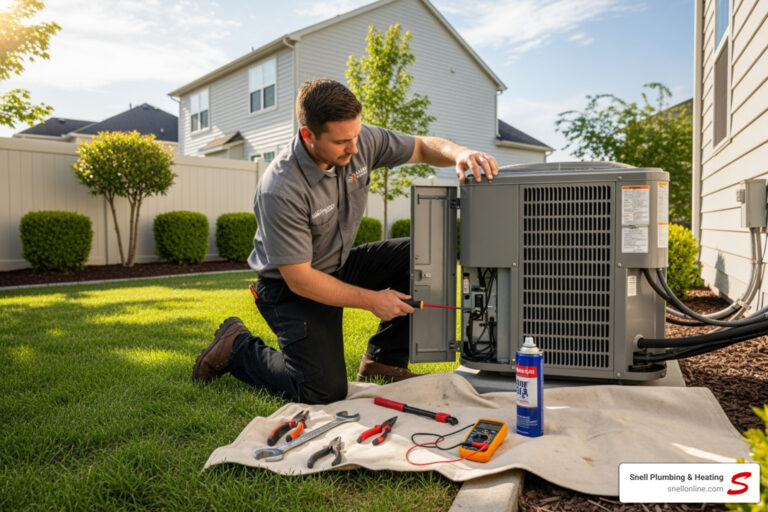If your heater seems to turn on and off more than usual without warming your home, you could be dealing with a short cycling issue. This kind of frequent stopping and starting isn’t just annoying. It can also lead to higher energy bills, equipment failure, and uneven indoor temperatures. This is a common heating problem that many homeowners in Springfield face, especially as fall sets in and systems are used more frequently.
Short cycling doesn’t always mean something major is broken. Sometimes, it can be a minor issue like a dirty filter or poor thermostat placement. Other times, it’s a sign of something more serious. Learning what causes it and how to stop it early can save you from bigger problems down the road. Here’s what you need to know to help keep your heating system running consistently, safely, and comfortably through the season.
Common Causes Of Short Cycling In Heating Systems
There are several reasons why your heating system might be turning on and off too often. Spotting the cause early can help avoid long-term damage and keep your indoor environment steady and efficient. Here are some of the most common problems:
1. Thermostat Issues
Your thermostat works as the control center for your HVAC system. If it’s malfunctioning, has failing batteries, or is placed near windows or heat sources, it might read the wrong temperature. That can cause your system to cycle unnecessarily. Homeowners in Springfield often see this happen when the thermostat is placed near a sunny window or a floor vent.
2. Clogged Air Filters
When air filters are clogged, airflow is restricted. This can cause your heater to overheat and shut off as a safety measure. Once it cools down, it may turn back on quickly, only to repeat the cycle. Replacing air filters on a regular schedule can help avoid this issue, especially during peak heating months.
3. Oversized Heating Systems
If your furnace is too large for your home, it might heat the room quickly and then shut off. While that might sound like a good thing, the short bursts of heat can create uneven temperatures and increased wear on your system. Over time, this can cause parts to wear out faster than normal. A properly sized system will heat more slowly and evenly, reducing stress and improving comfort.
Homeowners often misjudge the size of furnace they need, aiming for more power than necessary. Springfield homes built with older insulation or windows might not match well with larger units installed during updates or renovations. This mismatch can show up as short cycling long before you realize energy usage is creeping up.
Knowing these root causes is a big step toward stopping short cycling from getting worse or turning into a bigger repair job.
Effects Of Short Cycling On Your Heating System
Short cycling is more than an inconvenience. It impacts mechanical parts, shortens equipment life, and disrupts your comfort indoors. Many homeowners in Springfield don’t realize how quickly small issues can snowball into major repairs.
When your heating system turns off and on too frequently, it never goes through a full cycle. That means the parts that normally get breaks between heating calls are instead constantly starting and stopping. This startup process creates the most strain on motors and blowers, leading to faster wear over time. You’ll likely notice this with noisy operation, longer heating wait times, or inconsistent room temperatures.
Higher energy bills are another direct result. Since the system is working harder than it should, it pulls more energy without producing the steady comfort you expect. That increases monthly utility costs and sends a clear signal that your system isn’t running efficiently.
Comfort is another key area short cycling disrupts. It becomes harder for your system to maintain a consistent temperature across rooms. Some spaces may feel too warm just before the unit shuts off, while others may stay cold. This fluctuating operation leaves certain areas feeling drafty, even when your heater has been running all day.
Preventative Measures To Avoid Short Cycling
Reducing the risk of short cycling can be done with small checks and consistent upkeep. Addressing the source early on can keep your heating system in Springfield running without interruptions. Here are a few practical steps you can take:
– Schedule regular HVAC maintenance
A licensed technician can clean components, spot worn-out parts, and test how well your system is cycling. Twice-yearly visits, one before heating season and one after, can help you stay ahead of problems.
– Inspect your thermostat placement
Make sure your thermostat isn’t placed near windows, vents, or heat-producing appliances. These can make it misread the room temperature and cause short cycling. If needed, talk to a professional about relocating it to a better spot in your home.
– Change filters often
Clogged or dirty air filters restrict airflow and cause your heater to overheat and cycle off as a safety step. Check them monthly during high-use seasons and replace them if they look dirty or worn.
– Learn the right size system for your home
If your current unit is short cycling often, it could be too large for your home. A heating system that’s too powerful will reach the thermostat setting too quickly and shut off before delivering even heat. Having a technician evaluate your system’s size can lead to better long-term performance.
– Keep vents and registers clear
Blocked airflow from closed, blocked, or dusty vents can cause overheating or uneven heat delivery, triggering short cycling. Open each vent fully and make sure furniture or rugs aren’t covering them.
All of these steps can help prevent frequent cycling that leads to early system failure. They also support better energy usage, more stable indoor temperatures, and fewer repair surprises.
When To Call For Heating Repair In Springfield
Knowing when it’s time to bring in a technician can save you from long-term stress and higher repair bills. If your heater is short cycling daily, or you’ve tried filter changes and thermostat adjustments without luck, it’s a good idea to call for help. Systems that continue to shut off early could have deeper issues with the blower motor, heat exchanger, or internal wiring that require professional tools and training to handle.
Another sign it’s time to reach out is if you’ve noticed changes in how your system sounds or smells. Grinding, clanking, or burning odors combined with frequent short cycling is a clear sign something mechanical may be failing. The earlier it’s diagnosed, the greater the chance of avoiding part replacements and downtime during heating season.
Many homeowners in Springfield often wait until colder months to address heating concerns. But that delay can result in longer wait times for service or even system breakdowns on cold days. Taking proactive steps now means you’ll go into colder weather knowing your system is safe and functioning correctly.
Consistency matters with home comfort systems. A heating unit should provide quiet, even performance and cycle in steady intervals, not flicker on and off throughout the day. If your home in Springfield isn’t getting that reliability, it might be time to take a closer look at what your system is telling you.
If your heater is showing signs of short cycling or erratic behavior, it may be time to schedule heating repair in Springfield with our experienced technicians to ensure your system runs safely and efficiently throughout the season. Snell Plumbing & Heating is committed to resolving these issues with prompt service and care. For a quick estimate or to book a service visit, please contact us today.





